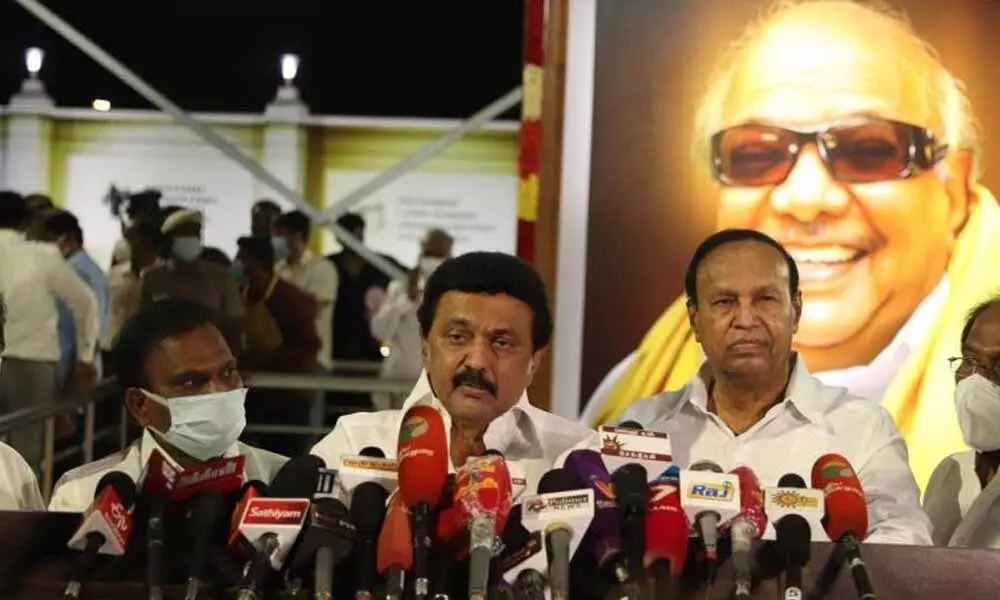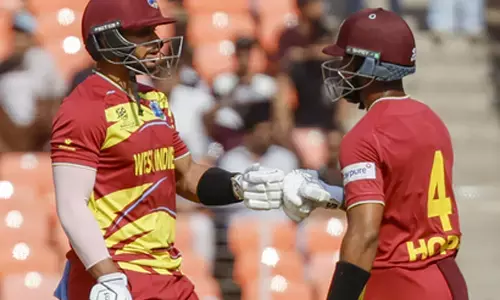Stalin evolving with inclusive politics in Tamil Nadu

Stalin evolving with inclusive politics in Tamil Nadu
When Muthuvel Karunanidhi Stalin assumed power after taking oath of office on May 7
Chennai: When Muthuvel Karunanidhi Stalin assumed power after taking oath of office on May 7, there was a general feeling that cult politics is on the way back to Tamil Nadu and that the new Chief Minister will practice what was known to him since the days of his late father M. Karunanidhi, his bete-noire and former Chief minister of the state, late MGR and the late Chief minister J. Jayalalithaa.
Politics practiced in those days was politics of hostility and politics of showing off power with Jayalalithaa becoming a classic example of creating an aura of working behind the curtains with even party colleagues and fellow ministers not being able to communicate with the Chief minister. Jaya even made it a practice that even senior ministers prostrated before her in open stages where mammoth public gatherings were held. The political fights, slugfests and the oneupmanship were too much to be tolerated in the political sphere of the state.
The fights reached a crescendo when Karunanidhi arrested and put Jayalalithaa behind bars in the disproportionate wealth cases and when Jaya came back to power, she took her revenge. An octogenarian Karunandhi who was a former Chief minister was picked by the Tamil Nadu police and arrested and TV channels across the globe flashed the face of Karunanidhi who was wailing in front of the camera.
Similar was the fate of Murosoli Maran, Karunanidhi's nephew and then Union minister in Vajpayee cabinet who was also arrested and picked up from his residence. Stalin seems to have put an end to the politics of hostilities and is focusing more on one of inclusiveness.
After the passing away of Jayalalithaa, the politics of cult or showbiz politics had to take a backseat as her successors in AIADMK, Edappadi K. Palaniswami and O. Panneerselvam being the Chief Minister and Deputy Chief Minister let go of the aura created by Jaya and instead were more accessible to the public and people could even meet the Chief Minister either at his office or residence.
More than this Palaniswami was down to earth and quick in implementing things and tried to develop a politics of alliance with the central government and even entered into a political alliance with the BJP in the state.
Jayalalithaa had also entered into a political alliance with the Vajpayee government but the relationship was always sore.
Stalin in his new avatar even after constituting a 13 member committee of legislators from all political parties having representation in the Tamil Nadu assembly has gone one step ahead by holding meetings with this committee on a day in a week and taking up the opinions and views of the legislators to tackle the Covid menace.
C. Rajeev, political analyst and director of Chennai based think tank, Centre for Policy and Development studies while speaking to IANS said, "As a person observing Tamil Nadu politics from close quarters, I am of the opinion that the politics of vendetta and oneupmanship which was practiced during the years of Karunanidhi, MGR and Jayalalithaa is gone and there is a politics of consensus evolving now. This will be good for the people of Tamil Nadu as inclusive politics has always been the one which favours the public the most and Stalin, contrary to expectations of a large number of people of the state is indeed practicing the politics of inclusiveness which is a welcome sign for the wholesome development of Tamil Nadu."
It has to be seen whether Stalin will continue with his politics of inclusiveness in the days to come or whether he will resort back to the politics of exclusiveness and hostilities. However the possibilities of such a political positioning from Stalin is remote as being a practical politician he knows clearly that with an NDA government at the centre, he will be the loser if politics of hostilities is practiced in Tamil Nadu. Stalin, according to insiders, is firm in opposing the central government in its politics but having a good bonding with the Modi dispensation for the development of the state.










